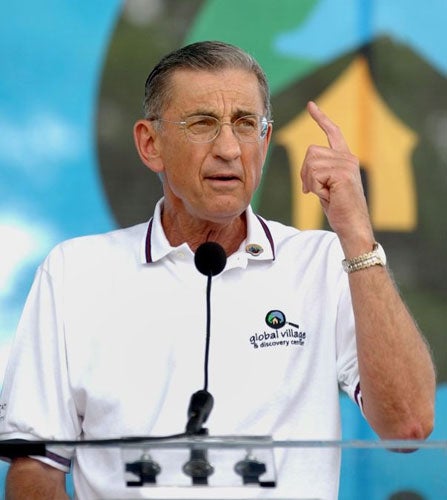Millard Fuller: Businessman and philanthropist who founded Habitat for Humanity International

Millard Fuller's life was a parable for our times – the story of a devout and visionary Christian whoin his early 30s turned his back ona hugely lucrative business career and became a global pioneer of affordable housing for the poor, in what is surely one of the most remarkable andinnovative philanthropic ventures in US history.
Today, Habitat for Humanity International, the organisation he founded with his wife in 1976, has builtsome 300,000 homes worldwide. For his work, Fuller was honoured bytwo American presidents, while a third former American president is among his most dedicated volunteers and admirers.
In his early years, there was little to hint at the transformation to come. Raised in modest circumstances in the Deep South, Fuller graduated from Auburn University in eastern Alabama, before enrolling at law school at the University of Alabama. The day he left in 1960, he and a fellow law student named Morris Dees set up a direct marketing company, with one unabashed aim: to get rich quick. The business did well, and the publishing venture that followed fared even better. By the time he was 29, Fuller was a millionaire.
But as his businesses flourished, his marriage foundered. A different couple might have separated. Instead, Fuller and his wife, Linda, whom he had married in 1959, re-examined their lives and decided to start anew as true Christians, turning their backs on wealth and its trappings and devoting themselves to helping others. At about the same time Dees had his own epiphany, selling the publishing company and setting up the Southern Poverty Law Center, now an internationally known civil rights and anti-race-hate group, based in Montgomery, Alabama.
Fuller's path was different. After selling the bulk of their possessions and giving the proceeds to charity, he and Linda moved to Koinonia Farm, a multi-racial Christian commune near Americus in rural western Georgia, which had fallen on hard times. There Fuller conceived his idea of non-profit housing, born of his entrepreneurial conviction that what the poor really needed was not charity, but capital.
Working closely with Clarence Jordan, a bible scholar and leader of the Koinonia community, the Fullers developed their model: a "Fund for Humanity" that would take in donations to buy construction materials. Volunteer workers – including the families who would eventually live in and own the houses – would build simple, solid houses. Once they had moved in, the homeowners would then repay the cost of the materials to the fund, without interest. This money would in turn be used to finance new houses and new projects.
In 1973, Fuller went to Zaire, now the Democratic Republic of theCongo, as director of development for the Church of Christ. There, he started a similar project that built 114 houses at the town of Mbandaka on the Congo River.
Three years later he returned to Koinonia, and founded Habitat for Humanity International. The formula quickly became a success. Many celebrities and other prominent people added to its renown by serving as volunteers – none with more impact than Jimmy Carter and his wife Rosalynn, who have put in a stint every year since 1984.
Fuller, the former president said in a statement, had been "one of the most extraordinary people I have ever known." What made him so extraordinary – and so effective – was not merely Fuller's deep Christianity, but the business and legal skills and sheer verve he brought to his mission. By 2003, Habitat and its affiliates had built over 150,000 homes and were active in 92 countries. By the end of Fuller's life that figure had almost doubled, meaning decent homes for more than a million people in the US and around the world.
For his work, he was honoured by both President George H.W. Bush and Bush's successor, Bill Clinton, who awarded Fuller the Presidential Medal of Freedom, the country's highest civilian honour, saying that he had "revolutionised the concept of philanthropy."
Thereafter, not even a rancorous split with Habitat for Humanity in 2005 could seriously damage hisreputation. The proximate reasons were allegations that he had sexually harassed at least one female employee. Fuller denied the charges, and they were never substantiated. He was none the less dismissed by Habitat's board, whose real complaint, Fuller believed, was that he was expanding the organisation too fast. "I havefaced this problem from the beginning," he said at the time, "of people always hanging on my coat-tails trying to hold me back."
Undeterred, that same year he founded a new organisation in Americus, the Fuller Center for Housing, which operated along the same lines as Habitat for Humanity. The Center is now active in 24 US states and 14 foreign countries.
If anything, the current economic crisis has provided extra validation for Fuller's creed. "As a society, we have confused wants and needs, and a lot of people have raised up their wants way above their needs, and way above their ability to support all those wants," he declared in a recent speech in Arkansas. "We've got to get back to the basics, and explain to people that you will not wither up and die if you don't have that widescreen TV."
Rupert Cornwell
Millard Dean Fuller, philanthropist and humanitarian: born Lanett, Alabama 3 January 1935; married 1959 LindaCaldwell (one son, three daughters); founder and president of Habitat for Humanity, 1976-2005; founder, The Fuller Center for Housing; died Americus, Georgia 2 February 2009.
Subscribe to Independent Premium to bookmark this article
Want to bookmark your favourite articles and stories to read or reference later? Start your Independent Premium subscription today.

Join our commenting forum
Join thought-provoking conversations, follow other Independent readers and see their replies